| Srl | Item |
| 1 |
ID:
111153
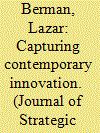

|
|
|
|
|
| Publication |
2012.
|
| Summary/Abstract |
The question of what enables some militaries to innovate effectively is of great interest to both scholars and commanders. However, the traditional models of military innovation fail to capture the complex innovation process. This study develops a new analytical framework that examines the pressures on and incentives for military innovation in the international, civil/military, organizational, and cultural planes and uses it to evaluate Israel Defense Forces (IDF) innovation between 2000 and 2009. Based on interviews with Israeli commanders and extensive research in Israel, this work finds that the IDF struggled to innovate before the 2006 war against Hizballah, but innovated effectively after the conflict once military and civilian leaders understood threats similarly. New models are needed to analyze the contemporary multi-dimensional innovative process.
|
|
|
|
|
|
|
|
|
|
|
|
|
|
|
|
| 2 |
ID:
111151
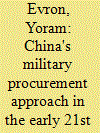

|
|
|
|
|
| Publication |
2012.
|
| Summary/Abstract |
This article attempts to lay out a conceptual framework for evaluating the actual military value of China's newly developed weaponry. Its basic assumption is that technological military progress is not sufficient to increase military strength. Therefore an alternative approach is adopted that studies the adaptability of the new technologies to the country's strategic situation. To this end, the study assumes that the value of a weapon system is measured by its suitability to the country's military, economic and technological conditions. The country's ability to meet these requirements depends to a large extent on the procurement process. Exploring China's recent military procurement approach, the study finds that under the prevailing conditions, China's military procurement process could reduce the actual military value of the newly developed weaponry.
|
|
|
|
|
|
|
|
|
|
|
|
|
|
|
|
| 3 |
ID:
111149
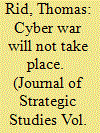

|
|
|
|
|
| Publication |
2012.
|
| Summary/Abstract |
For almost two decades, experts and defense establishments the world over have been predicting that cyber war is coming. But is it? This article argues in three steps that cyber war has never happened in the past, that cyber war does not take place in the present, and that it is unlikely that cyber war will occur in the future. It first outlines what would constitute cyber war: a potentially lethal, instrumental, and political act of force conducted through malicious code. The second part shows what cyber war is not, case-by-case. Not one single cyber offense on record constitutes an act of war on its own. The final part offers a more nuanced terminology to come to terms with cyber attacks. All politically motivated cyber attacks are merely sophisticated versions of three activities that are as old as warfare itself: sabotage, espionage, and subversion.
|
|
|
|
|
|
|
|
|
|
|
|
|
|
|
|
| 4 |
ID:
111152
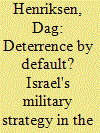

|
|
|
|
|
| Publication |
2012.
|
| Summary/Abstract |
This article explores the question: What was Israel's military strategy when it went to war against Hizballah and Lebanon in 2006? It argues that Israel's decision to go to war was not based on a thorough in-depth analysis of the specific situation at hand, but rather rooted in its strategic outlook cultivated in the decades preceding the war. This thinking has largely focused on the concept of deterrence, and should deterrence fail, to restore deterrence and ensure that the opponent would refrain from similar actions in the future. The need to have a clear political component - which the military effort should support - appears to have been significantly less in focus. Thus an almost pre-destined recipe of responding militarily 'dramatically beyond the expectations of the enemy' was put in action from the outset. The perception that a more specifically tailored military strategy was not needed was a miscalculation.
|
|
|
|
|
|
|
|
|
|
|
|
|
|
|
|
| 5 |
ID:
111150
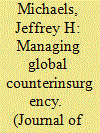

|
|
|
|
|
| Publication |
2012.
|
| Summary/Abstract |
The contemporary American counterinsurgency discourse has emphasised a particular historical narrative of Vietnam to justify large-scale military operations in Iraq and Afghanistan. Absent from this narrative is any reference to the broader Cold War context in which Vietnam existed alongside numerous other small-scale counterinsurgencies and was therefore the exception, not the rule. This article seeks to redress this shortcoming by examining the way counterinsurgency was conceived and managed at the level of 'grand strategy.' Specifically, it focuses on the Special Group (Counterinsurgency) to demonstrate that senior policymakers under Presidents Kennedy and Johnson understood 'counterinsurgency' as involving 'indirect' assistance to foreign governments, rather than taking 'direct' military action with American ground forces.
|
|
|
|
|
|
|
|
|
|
|
|
|
|
|
|